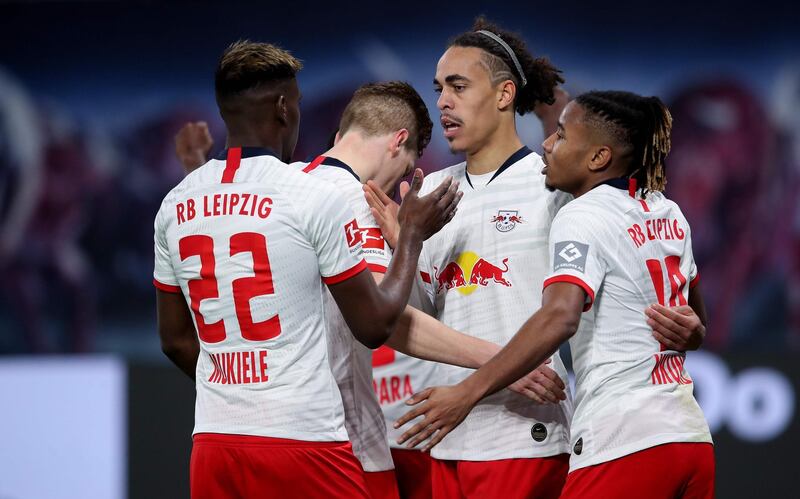The Bundesliga has ended the 2010s with a novelty. It has a first-time winter champion, and a first club from the country’s east lording it over the rest at the season’s halfway stage. RB Leipzig will be enjoying their four-week break, which gives them plenty of time to weigh up what being ‘winter champions’ really means.
There is no trophy that comes with the achievement, but in Germany folk make more of a fuss than elsewhere of whoever is first in the table with 17 of the 34 matchdays completed. The omens are good. Only twice in the last nine years did the winter leader fall away and not end up with the Bundesliga Shield the following May. In 2012, Borussia Dortmund overtook Bayern Munich; last season Bayern caught up with, and passed, Dortmund.
Those two are the only clubs to have won the title in the last decade. Bayern have held it uninterrupted for the last seven years. To have one fresh contender, in Leipzig, setting the pace is refreshing. To have two seems almost revolutionary.
Borussia Monchengladbach, second, have led the table this season for longer than anybody. But then Bayern, the defending champions - who won all their six titles between 2013 and 2018 by margins between 10 points and 25 points - have had a turbulent 2019. They now look not only over one shoulder - at Dortmund - for any threat to status, but over both. The pretenders are several: Dortmund, fourth, trail Bayern by only three points, and Leipzig by seven in a thrillingly open race.
Bayern did win the Double in 2019, but finished only two points ahead of Dortmund in the closest duel of the decade. The 5-0 thrashing they handed out to their major rivals in April proved crucial.
Many of Bayern’s efficient habits have apparently diminished in the last 12 months but seemingly they can always be relied on to crush Dortmund in Munich. It was 4-0 last month, and yet again, Robert Lewandowski reminded Dortmund that just about the most era-defining transfer of the 2010s was the one that took him from Dortmund to Bayern in 2014.
For all that Dortmund tried to shore up their defence by bringing defender Mats Hummels back from Bayern in the summer, there is no antidote to the Pole.
In 2019, Lewandowski scored 54 goals for club and country. That was in 58 matches. He has become not only the peerless predator of the modern game but a footballer of all-round creative excellence.
Some context: only once in the last decade has anybody playing in Europe other than Cristiano Ronaldo or Lionel Messi ended a calendar year with the most goals. That was Harry Kane in 2017. Lewandowski has achieved the landmark in probably the least dominant Bayern team of his time there and in a Bayern that said farewell to two of his greatest allies, Franck Ribery and Arjen Robben.
Last week, Lewandowski moved to third place in the all-time Bundesliga scorers’ list, overtaking the 220 career goals of Jupp Heynckes, the former Bayern manager and the key striker from Monchengladback’s gilded 1970s.
Eclipsing Gerd Muller’s 365 goals in Germany’s top flight looks an unreachable target even for Lewandowski, although Klaus Fischer’s 268, spread over 19 seasons, may not be if he remains at Bayern as long they want him to.
He is 31, and need only look at another record-breaker to imagine he might have another 10 years of potent finishing in him. Claudio Pizarro, now in a third spell at Werder Bremen, turned 41 in October. Earlier this year he became the Bundesliga’s oldest scorer.
Pizarro, whose Bremen are at the wrong end of the table in what looks a tense relegation dogfight, is almost a decade older than Julian Nagelsmann, Leipzig’s boyish manager.
In a standout year for German coaching - Jurgen Klopp at last won a major European final and goes from strength to strength at Liverpool - new names are emerging. Marco Rose, 43, has guided Gladbach to their heights in his first season as a Bundesliga manager, while Bayern, having sacked Niko Kovac, entrusted their title bid to Hansi Flick, promoted from his role as deputy.
“We’re very satisfied with his work and development of the players under him,” said Bayern CEO Karl-Heinz Rummenigge.
There was a surprise comeback for an old favourite, too. Jurgen Klinsmann’s appointment at Hertha Berlin, over ten years after his last adventure in Germany with Bayern, lends glamour to the capital and ensures a lively start to the second half of a gripping league. Hertha host Bayern on the first weekend after the winter break.







